
Who’s Afraid of Deskilling?
On 12 Sep 2025 by Mike StandardMany seasoned medical (and non-medical) hands are being wrung these days over dependence on AI sapping the clinical skills of trainees. It will. And that’s ok. But we do have a much bigger problem of medical education on our hands.
The days began to fly now, and yet each one of them was stretched by renewed expectations and swollen with silent, private experiences. Yes, time is a puzzling thing, there is something about it that is hard to explain.
— Thomas Mann, The Magic Mountain, 1924

Behrens is the Medical Director for a resort full of tuberculosis patients in Mann’s novel set around 1910, and his physical exam skills are astonishing. Beyond some very primitive x-rays, more literary metaphor than diagnostic tool, he pinpoints each character’s disease and its progression with just a stethoscope and wit. I’ve never met a physician who could do likewise. We’ve “deskilled” massively in the century and change since.
And yet, we’re far better at diagnosing & treating tuberculosis than in the world of The Magic Mountain. Just as my meager physical exam skills would be useless in Behrens’ sanatorium, so a Behrens brought to life in 2025 would have lots to learn – interferon gamma release assays, confounding from BCG vaccination and CT scans, not to mention all the nuances and side effects of combination antibiotic therapy.
Doctors – like any profession – learn, retain and relearn the skills of their time. Those skills always have and always will change with technology. Admittedly, AI is a big change, arguably right up there with penicillin. But nonetheless, a change to which doctors will adapt and use to deliver better, faster care. Certainly where I live in Central California, we have no surplus of skilled physicians. Anything that makes us more efficient and helps more kids get care is a godsend.
Science Accelerated
To boot, it’s a mad fiction that human doctors are able to keep up with the astonishing pace of modern biomedical discovery. In the pre-internet dark ages, the total corpus of scientific papers was measured in the thousands. Today, PubMed is pushing 40 million articles. When I first took biology, genes were studied 1 at a time, a few thousand base pairs in big, slow research labs. Today, patients routinely get whole genome sequencing covering 3 billion base pairs. As my most senior colleagues started training in the 1970s, in the span of their careers, we’ve gone from a world of Renaissance-people to a brave new world where no one can possibly keep up with anything but a narrowly sub-specialized field.

The Real Deskilling Problem
This, I believe, is the real challenge of AI “deskilling”. How the heck do you design a medical curriculum in a world changing this fast?
Today, the fastest path through American med school & residency is 7 years, not to mention 4 years of undergrad before that. When the Flexner Report ushered in the current era of medical education in 1910, exactly when Dr Behrens was auscultating caseous lung lesions on the Magic Mountain, training Renaissance-doctors was a perfectly reasonable goal. Per the PubMed graphs above, the curve of scientific discovery was only gently rising. The skills you learned in 1910 were safely relevant in 1917 and well beyond with just a smattering of “continuing education”. That is not true today.
Attention is All You Need inaugurated the world of LLMs in 2017. ChatGPT exploded into public consciousness in 2022. A mere 3 years later, and AI is already a part of daily life and sure to accelerate the already staggering exponential growth in scientific discovery.
I’d be terrified if today my alma mater asked me to design their med school curriculum. 7 years is a very, very long time in tech years. Those PubMed graphs are very steep. I have barely a guess what medical skills will be relevant in 2032.
Exhibit A – Board Exams Allow Everything…Except AI
To their great credit, around 2017, my American Board of Pediatrics took a momentous decision. Instead of requiring pediatricians to take a massive recertification exam every 10 years predicated on massive fact memorization, they began offering 17 open book questions quarterly. Use any resource at your disposal, but you only have 5 minutes per question. Wonderful! Much more like actual clinical practice in a world of rapid scientific discovery. It’s proved wildly popular.
Unfortunately for them, ChatGPT hit just a few years into their experiment and forced a hasty policy update. Now, the exam is open book…except for AI. Leaving aside practical questions like “should I put a post-it note over the AI search now in every Google query (and some UpToDate searches!)”, it’s an unintentional endorsement of a shocking conclusion. In a world where AI aces medical exams, the medical reasoning we cram into students at great expense is suddenly obsolete.
AI vs 100-Year Old Medical Education
That calculus remains the standard premed math class in 2025 is a mad waste of time. Don’t get me wrong – calculus is a work of inspired genius and a foundation of the modern world. But I use more math than just about any of my colleagues, and I haven’t had to calculate a definite integral since I was 18. Even PhD engineering friends who build robots & satellites for a living admit they never directly use calculus. Organic chemistry & physics, enshrined since 1930, are almost as impractical.
I often get the counter that orgo remains the great premed filter protecting the public from those without the intellectual muscle to be good doctors. Even if you think that’s true, why orgo? We could make students learn quantum mechanics or Navajo if that were the only criterion. Years spent in calculus, physics & orgo would be better put to the foundational skills doctors need in an AI age. Linear algebra, statistics and, gasp, computer science all come to mind and can surely test intellectual muscle.
Yet, we approach 100 years of unchanged premed requirements. Perhaps a century of curricular stability would have been fine 1830-1930. It might just hold on till 2030. But 2130?
Is It Empathy?
I put this question to a bunch of very tech savvy doctor friends. By far the #1 answer I got was “human physicians bring empathy that AI lacks”. Even if that remains true as AI advances, why are students spending 11+ years learning calculus & biochemistry? I know some very empathetic nurses & social workers. Will society really keep paying physicians to be mostly empathetic while also being less good at pharmacology than AI?
I’m not claiming AI will soon replace human physicians. But if the long educational path for physicians needs another 100 years to adapt, surely a different profession will take its place.
You may also like
1 comment
Archives
Calendar
| M | T | W | T | F | S | S |
|---|---|---|---|---|---|---|
| 1 | 2 | 3 | 4 | |||
| 5 | 6 | 7 | 8 | 9 | 10 | 11 |
| 12 | 13 | 14 | 15 | 16 | 17 | 18 |
| 19 | 20 | 21 | 22 | 23 | 24 | 25 |
| 26 | 27 | 28 | 29 | 30 | 31 | |